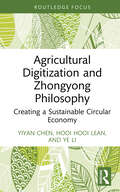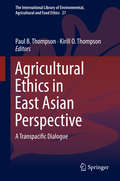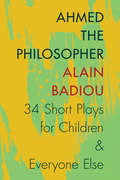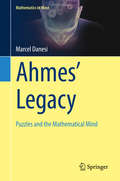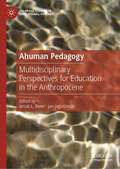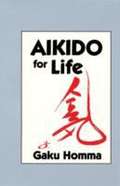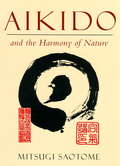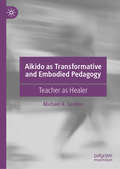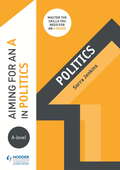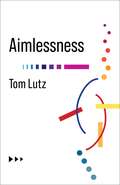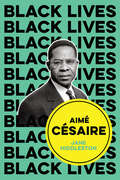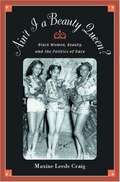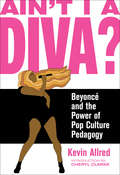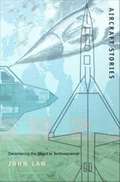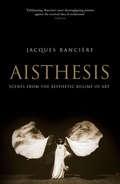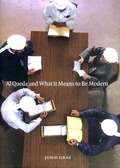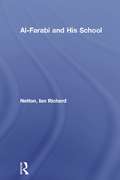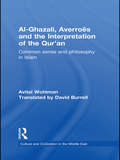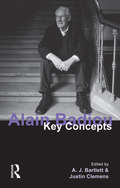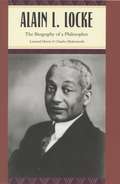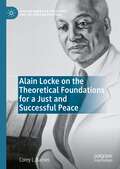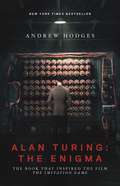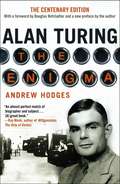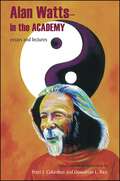- Table View
- List View
Agricultural Digitization and Zhongyong Philosophy: Creating a Sustainable Circular Economy (Routledge Focus on Environment and Sustainability)
by Ye Li Yiyan Chen Hooi Hooi LeanThis interdisciplinary book combines digital technology with Eastern philosophy to examine how the concept of Zhongyong in Confucianism can be used to coordinate digital technology with sustainable agriculture. Zhongyong comes from the connotation of moderate and sustainable in ancient Chinese culture. It is with this concept in mind that this book presents a novel collaboration between philosophy and computer technology to explain how Zhongyong can play an important part in realizing agricultural digitization within a circular economy in order to help solve the current food crisis. The book examines two popular, yet contradictory, digital technologies—blockchain and the green data center. It showcases how the use of traditional Chinese Zhongyong can promote the decentralization of blockchain and the centralization of the green data center and explains the advantages of using both technologies simultaneously. The book puts forward a digital circular agricultural framework that embeds both blockchain and the green data center through an actual case study. While this book specifically focuses on agriculture, it also provides readers with a new perspective for thinking further on how to break down the disciplinary barriers between the social sciences and natural sciences. This book will be of great interest to students and scholars of agriculture, digital technologies, circular economy, sustainable development, and Eastern philosophy.
Agricultural Ethics in East Asian Perspective: A Transpacific Dialogue (The International Library of Environmental, Agricultural and Food Ethics #27)
by Paul B. Thompson Kirill O. ThompsonThis book brings together agricultural ethics scholars from the US, Japan and Taiwan to discuss crucial issues in agricultural ethics and sustainability ethics in comparative context. Agricultural ethics and sustainability ethics are wide-ranging and closely linked to environmental ethics, bioethics, virtue ethics, animal welfare, soil conservation, not to mention rural traditions and lifestyles. Six of the chapters cover historical traditions and values in Europe, the US and East Asia. Four of the chapters cover the role of virtue ethics in the analysis of agrarian and environmental ethics, agricultural biotechnology, food ethics, and alternative agriculture, respectively. Finally, two of the chapters cover field efforts of agricultural ethics involving preserving agricultural heritage and building consensus for sustainable farming, respectively. Although the papers are divided into three groups, their contents are interconnected and mutually informative.
Ahmed the Philosopher: Thirty-Four Short Plays for Children and Everyone Else
by Alain BadiouEnglish-speaking readers might be surprised to learn that Alain Badiou writes fiction and plays along with his philosophical works and that they are just as important to understanding his larger intellectual project. In Ahmed the Philosopher, Badiou's most entertaining and accessible play, translated into English here for the first time, readers are introduced to Badiou's philosophy through a theatrical tour de force that has met with much success in France. <P><P> Ahmed the Philosopher presents its comic hero, the "treacherous servant" Ahmed, as a seductively trenchant philosopher even as it casts philosophy itself as a comic performance. The comedy unfolds as a series of lessons, with each "short play" or sketch illuminating a different Badiousian concept. Yet Ahmed does more than illustrate philosophical abstractions; he embodies and vivifies the theatrical and performative aspects of philosophy, mobilizing a comic energy that exposes the emptiness and pomp of the world. Through his example, the audience is moved to a living engagement with philosophy, discovering in it the power to break through the limits of everyday life.
Ahmes’ Legacy: Puzzles And The Mathematical Mind (Mathematics in Mind)
by Marcel DanesiThis book looks at classic puzzles from the perspective of their structures and what they tell us about the brain. It uses the work on the neuroscience of mathematics from Dehaene, Butterworth, Lakoff, Núñez, and many others as a lens to understand the ways in which puzzles reflect imaginative processes blended with rational ones. The book is not about recreational or puzzle-based mathematics in and of itself but rather about what the classic puzzles tell us about the mathematical imagination and its impact on the discipline. It delves into the history of classic math puzzles, deconstructing their raison d’être and describing their psychological features, so that their nature can be fleshed out in order to help understand the mathematical mind.This volume is the first monographic treatment of the psychological nature of puzzles in mathematics. With its user-friendly technical level of discussion, it is of interest to both general readers and those who engage in the disciplines of mathematics, psychology, neuroscience, and/or anthropology. It is also ideal as a textbook source for courses in recreational mathematics, or as reference material in introductory college math courses.
Ahuman Pedagogy: Multidisciplinary Perspectives for Education in the Anthropocene (Palgrave Studies in Educational Futures)
by Jan Jagodzinski Jessie L. BeierThis book brings together a collection of multi-disciplinary voices to discuss, debate, and devise a series of ahuman pedagogical proposals that aim to address the challenging ecological, political, social, economic, and aesthetic milieu within which education is situated today. Attending to contemporary calls to decenter all-too-human educational research and practice, while also coming to terms with the limits and inheritances through which such calls are made possible in the first place, this book aims to interrogate, but also invent, what we are calling an ahuman pedagogy. Organized in three main sections — Conjuring an Ahuman Pedagogy, Machinic Re/distributions, and Non-pedagogies for Unthought Futures — this multi-disciplinary experiment in ahuman pedagogies for the age of the Anthropocene offers an experimental – albeit always speculative and incomplete – series of pedagogical proposals that work to unthink and counter-actualize educational futures-as-usual.
Aikido For Life
by Gaku HommaA teacher's guide for instructing beginners of Aikido--this book appeals to the new beginner and experienced student alike. Nippon Kan was established in 1980 as a center for Denver residents to experience Japanese culture. The center has since served more than 6,000 students with its variety of classes, but its core is still Aikido. Thousands of students have benefitted from Gaku Homma's form of dynamic Aikido.
Aikido and the Harmony of Nature
by Mitsugi SaotomeHere is a unique approach to the teachings of the Founder of Aikido, Morihei Ueshiba, as interpreted by his direct student of fifteen years. Mitsugi Saotome examines the spiritual philosophy of the Founder, the warrior ideals of feudal Japan as the basis of his martial arts philosophy, and the scientific principles underlying the philosophy of Aikido technique. The author shows that the physical movement of Aikido is the embodiment of principles of the spirit. Negative force is not countered with aggression but is controlled and redirected through the power and balance of spiral movement. This is the shape of Aikido and the dynamic shape at the foundation of all energies of existence. Aikido movement can only be understood from its roots in universal law and the processes of nature. The sincere practice and study of Aikido deepens our appreciation for the perfection of nature's balance and brings us back into harmony with our environment, other people, and ourselves. Abundantly illustrated with the author's drawings, diagrams, and calligraphies, as well as photographs demonstrating Aikido techniques, the book also offers a history of Aikido, personal anecdotes about the Founder, and translations of several of his lectures.
Aikido as Transformative and Embodied Pedagogy: Teacher as Healer
by Michael A. GordonDrawing on the author’s lifelong practice in the non-competitive and defensive Japanese art of Aikido, this book examines education as self-cultivation, from a Japanese philosophy (e.g. Buddhist) perspective. Contemplative practices, such as secular mindfulness meditation, are being increasingly integrated into pedagogical settings to enhance social and emotional learning and well-being and to address stress-induced overwhelm due to increased pressures on the education system and its constituents. The chapters in this book explore the various ways, through the lens of this non-violent relational art of Aikido, that pedagogy is always something being practiced (on the level of psychological, somatic and emotional registers) and thus holding potential for transformation into being more relational, ecological-minded, and reflecting more ‘embodied attunement.’ Positioning education as a practice, one of self-discovery, the author argues that one can approach personal development as engaging in a spiritual process of integrating mind and body towards full presence of being and existence.
Aiming for an A in A-level Politics
by Sarra JenkinsExam Board: AQA, Edexcel, WJEC/Eduqas Level: A-level Subject: Politics First teaching: September 2017 First exams: Summer 2019 Master the skills you need to set yourself apart and hit the highest grades; this year-round course companion develops the higher-order thinking skills that top-achieving students possess, providing step-by-step guidance, examples and tips for getting an A grade.Written by experienced author and teacher Sarra Jenkins, Aiming for an A in A-level Politics:Helps you develop the 'A grade skills' of analysis, evaluation, creation and applicationTakes you step by step through specific skills you need to master in A-level Politics, so you can apply these skills and approach each exam question as an A/A* candidateClearly shows how to move up the grades with sample responses annotated to highlight the key features of A/A* answersHelps you practise to achieve the levels expected of top-performing students, using in-class or homework activities and further reading tasks that stretch towards university-level studyPerfects exam technique through practical tips and examples of common pitfalls to avoid Cultivates effective revision habits for success, with tips and strategies for producing and using revision resourcesSupports the major exam boards, outlining the Assessment Objectives for reaching the higher levels under the AQA, Edexcel and WJEC/Eduqas specifications.
Aiming for an A in A-level Politics
by Sarra JenkinsExam Board: AQA, Edexcel, WJEC/Eduqas Level: A-level Subject: Politics First teaching: September 2017 First exams: Summer 2019 Master the skills you need to set yourself apart and hit the highest grades; this year-round course companion develops the higher-order thinking skills that top-achieving students possess, providing step-by-step guidance, examples and tips for getting an A grade.Written by experienced author and teacher Sarra Jenkins, Aiming for an A in A-level Politics:Helps you develop the 'A grade skills' of analysis, evaluation, creation and applicationTakes you step by step through specific skills you need to master in A-level Politics, so you can apply these skills and approach each exam question as an A/A* candidateClearly shows how to move up the grades with sample responses annotated to highlight the key features of A/A* answersHelps you practise to achieve the levels expected of top-performing students, using in-class or homework activities and further reading tasks that stretch towards university-level studyPerfects exam technique through practical tips and examples of common pitfalls to avoid Cultivates effective revision habits for success, with tips and strategies for producing and using revision resourcesSupports the major exam boards, outlining the Assessment Objectives for reaching the higher levels under the AQA, Edexcel and WJEC/Eduqas specifications.
Aimlessness (No Limits)
by Tom LutzOur culture values striving, purpose, achievement, and accumulation. This book asks us to get sidetracked along the way. It praises aimlessness as a source of creativity and an alternative to the demand for linear, efficient, instrumentalist thinking and productivity.Aimlessness collects ideas and stories from around the world that value indirection, wandering, getting lost, waiting, meandering, lingering, sitting, laying about, daydreaming, and other ways to be open to possibility, chaos, and multiplicity. Tom Lutz considers aimlessness as a fundamental human proclivity and method, one that has been vilified by modern industrial societies but celebrated by many religious traditions, philosophers, writers, and artists. He roams a circular path that snakes and forks down sideroads, traipsing through modernist art, nomadic life, slacker comedies, drugs, travel, nirvana, and oblivion. The book is structured as a recursive, disjunctive spiral of short sections, a collage of narrative, anecdotal, analytic, and lyrical passages—intended to be read aimlessly, to wind up someplace unexpected.
Aimé Césaire: Inventor of Souls (Black Lives)
by Jane HiddlestonAimé Césaire is arguably the greatest Caribbean literary writer in history. Best known for his incendiary epic poem Notebook of a Return to My Native Land, Césaire reinvented black culture by conceiving ‘négritude’ as a dynamic and continuous process of self-creation. In this essential new account of his life and work, Jane Hiddleston introduces readers to Césaire’s unique poetic voice and to his role as a figurehead for intellectuals pursuing freedom and equality for black people. Césaire was deeply immersed in the political life of his native Martinique for over fifty years: as Mayor of Fort-de-France and Deputy at the French National Assembly, he called for the liberation of oppressed people at home and abroad, while celebrating black creativity and self-invention to resist a history of racism. Césaire’s extraordinary life reminds us that the much-needed revolt against oppression and subjugation can—and should—come from within the establishment, as well as without.
Ain't I A Beauty Queen?: Black Women, Beauty, and the Politics of Race
by Maxine Leeds Craig"Black is Beautiful!" The words were the exuberant rallying cry of a generation of black women who threw away their straightening combs and adopted a proud new style they called the Afro. The Afro, as worn most famously by Angela Davis, became a veritable icon of the Sixties. Although the new beauty standards seemed to arise overnight, they actually had deep roots within black communities. Tracing her story to 1891, when a black newspaper launched a contest to find the most beautiful woman of the race, Maxine Leeds Craig documents how black women have negotiated the intersection of race, class, politics, and personal appearance in their lives. Craig takes the reader from beauty parlors in the 1940s to late night political meetings in the 1960s to demonstrate the powerful influence of social movements on the experience of daily life. With sources ranging from oral histories of Civil Rights and Black Power Movement activists and men and women who stood on the sidelines to black popular magazines and the black movement press, Ain't I a Beauty Queen'will fascinate those interested in beauty culture, gender, class, and the dynamics of race and social movements.
Ain't I a Diva?: Beyoncé and the Power of Pop Culture Pedagogy
by Kevin Allred&“[Allred] interrogates Beyoncé&’s music and videos to explore the complicated spaces where racism, sexism, and capitalism collide.&” —Kirkus Reviews In 2010, Professor Kevin Allred created the university course &“Politicizing Beyoncé&” to both wide acclaim and controversy. He outlines his pedagogical philosophy in Ain&’t I a Diva?, exploring what it means to build a syllabus around a celebrity. Topics range from a capitalist critique of &“Run the World (Girls)&” to the politics of self-care found in &“Flawless&”; Beyoncé&’s art is read alongside black feminist thinkers including Kimberlé Crenshaw, Octavia Butler, and Sojourner Truth. Combining analysis with classroom anecdotes, Allred attests that pop culture is so much more than a guilty pleasure, it&’s an access point—for education, entertainment, critical inquiry, and politics.&“Proving himself a worthy member of the BeyHive, Kevin Allred takes us on a journey through Beyoncé&’s greatest hits and expansive career—peeling back their multiple layers to explore gender, race, sexuality, and power in today&’s modern world. A fun, engaging, and important read for long-time Beyoncé fans and newcomers alike.&” —Franchesca Ramsey, author of Well, That Escalated Quickly&“Ain&’t I a Diva? explores the phenomenon of Beyoncé while explicitly championing not only her immense talent and grace but what we can learn from it. In this celebration of Beyoncé, and through her, other Black women, Allred is giving us room to be exactly who we are so that maybe we, too, can stop the world then carry on!&” —Keah Brown, author of The Pretty One&“A must-read for any fan of Beyoncé and of fascinating feminist discourse.&” —Zeba Blay, senior culture writer, HuffPost
Aircraft Stories: Decentering the Object in Technoscience
by John LawIn Aircraft Stories noted sociologist of technoscience John Law tells "stories" about a British attempt to build a military aircraft--the TSR2. The intertwining of these stories demonstrates the ways in which particular technological projects can be understood in a world of complex contexts. Law works to upset the binary between the modernist concept of knowledge, subjects, and objects as having centered and concrete essences and the postmodernist notion that all is fragmented and centerless. The structure and content of Aircraft Stories reflect Law's contention that knowledge, subjects, and--particularly-- objects are "fractionally coherent": that is, they are drawn together without necessarily being centered. In studying the process of this particular aircraft's design, construction, and eventual cancellation, Law develops a range of metaphors to describe both its fractional character and the ways its various aspects interact with each other. Offering numerous insights into the way we theorize the working of systems, he explores the overlaps between singularity and multiplicity and reveals rich new meaning in such concepts as oscillation, interference, fractionality, and rhizomatic networks. The methodology and insights of Aircraft Stories will be invaluable to students in science and technology studies and will engage others who are interested in the ways that contemporary paradigms have limited our ability to see objects in their true complexity.
Aisthesis
by Jacques Ranciere Zakir PaulComposed in a series of scenes, Aisthesis-Rancière's definitive statement on the aesthetic-takes its reader from Dresden in 1764 to New York in 1941. Along the way, we view the Belvedere Torso with Winckelmann, accompany Hegel to the museum and Mallarmé to the Folies-Bergère, attend a lecture by Emerson, visit exhibitions in Paris and New York, factories in Berlin, and film sets in Moscow and Hollywood. Rancière uses these sites and events--some famous, others forgotten--to ask what becomes art and what comes of it. He shows how a regime of artistic perception and interpretation was constituted and transformed by erasing the specificities of the different arts, as well as the borders that separated them from ordinary experience. This incisive study provides a history of artistic modernity far removed from the conventional postures of modernism.
Al Qaeda and What It Means to Be Modern
by John GrayIn this compact analysis, Gray (European thought, London School of Economics) demonstrates that, contrary to popular opinion, the ideology of Al Qaeda is both Western and modern. Touching on the philosophical roots of Al Qaeda, the brief history of the global free market, the collapse of states, and the rise of unconventional warfare, he revises the conventional wisdom of the post-September 11th era. He confronts the Western faith in global development, technology, and democracy, revealing dangerous flaws in America's drive to create a global economy and worldwide democracy. Annotation ©2004 Book News, Inc., Portland, OR (booknews.com)
Al-Farabi and His School
by Ian Richard NettonExamines one of the most exciting and dynamic periods in the development of medieval Islam, from the late 9th to the early 11th century, through the thought of five of its principal thinkers, prime among them al-Farabi. This great Islamic philosopher, called 'the Second Master' after Aristotle, produced a recognizable school of thought in which others pursued and developed some of his own intellectual preoccupations. Their thought is treated with particular reference to the most basic questions which can be asked in the theory of knowledge or epistemology. The book thus fills a lacuna in the literature by using this approach to highlight the intellectual continuity which was maintained in an age of flux. Particular attention is paid to the ethical dimensions of knowledge.
Al-Ghazali, Averroes and the Interpretation of the Qur'an: Common Sense and Philosophy in Islam (Culture and Civilization in the Middle East)
by Avital WohlmanThis book examines the contrasting interpretations of Islam and the Qur’an by Averroes and Al-Ghazali, as a way of helping us untangle current impasses affecting each Abrahamic faith. This has traditionally been portrayed as a battle between philosophy and theology, but the book shows that Averroes was rather more religious and Al-Ghazali more philosophical than they are usually portrayed. The book traces the interaction between two Muslim thinkers, showing how each is convinced of the existence of a Book in which God is revealed to rational beings, to whom He has given commandments, as well as of the excellence of Islamic society. Yet they differ regarding the proper way to interpret the sacred Book. From this point of view, their discussion does not address the contrast between philosophy and religion, or that between reason and revelation that is so characteristic of the Middle Ages, but rather explores differences at the heart of philosophical discussion in our day: is there a level of discourse which will facilitate mutual comprehension among persons, allowing them to engage in debate? This interpretation of sacred texts illustrates the ways religious practice can shape believers’ readings of their sacred texts, and how philosophical interpretations can be modified by religious practice. Moreover, since this sort of inquiry characterizes each Abrahamic tradition, this study can be expected to enhance interfaith conversation and explore religious ways to enhance tolerance between other believers.
Alain Badiou: Key Concepts (Key Concepts)
by Justin Clemens A. J. BartlettAlain Badiou is one of the world's most influential living philosophers. Few contemporary thinkers display his breadth of argument and reference, or his ability to intervene in debates critical to both analytic and continental philosophy. Alain Badiou: Key Concepts presents an overview of and introduction to the full range of Badiou's thinking. Essays focus on the foundations of Badiou's thought, his "key concepts" - truth, being, ontology, the subject, and conditions - and on his engagement with a range of thinkers central to his philosophy, including Plato, Descartes, Spinoza, Heidegger and Deleuze.
Alain L. Locke: Biography of a Philosopher
by Leonard Harris Charles MolesworthAlain L. Locke (1886-1954), in his famous 1925 anthology "The New Negro", declared that "the pulse of the Negro world has begun to beat in Harlem". Often called the father of the Harlem Renaissance, Locke had his finger directly on that pulse, promoting, influencing, and sparring. Leonard Harris and Charles Molesworth trace Locke's story through his Philadelphia upbringing, his undergraduate years at Harvard and his tenure as the first African American Rhodes Scholar. The heart of their narrative illuminates Locke's heady years in 1920s New York City and his forty-year career at Howard University, where he helped spearhead the adult education movement of the 1930s and wrote on topics ranging from the philosophy of value to the theory of democracy. Harris and Molesworth show that throughout this illustrious career -- despite a formal manner that many observers interpreted as elitist or distant -- Locke remained a warm and effective teacher and mentor, as well as a fierce champion of literature and art as means of breaking down barriers between communities. The multifaceted portrait that emerges from this engaging account effectively reclaims Locke's rightful place in the pantheon of America's most important minds.
Alain Locke on the Theoretical Foundations for a Just and Successful Peace (African American Philosophy and the African Diaspora)
by Corey L. BarnesAlain Locke is most known for his involvement in the Harlem Renaissance. However, he received his PhD in philosophy from Harvard University in 1918, and produced a very large corpus of philosophical work. His work shows him to have been a sophisticated philosopher who thought through practical and theoretical problems regarding the nature of cosmopolitanism, democracy, race, value, religion, art, and education. Although Locke’s philosophical work has been discussed in parts, there has been no theorizing about how his different philosophical commitments fit together. In this book Corey L. Barnes begins to systematize Locke’s philosophical thought, showing how his democratic theory, philosophy of race, and value theory are connected to and undergirded by a commitment to cosmopolitanism. In so doing, Barnes unearths aspects of Locke’s thought—for example, his economic thinking—that have not been accorded attention and reimagines parts of his work about which have been theorized, all while bringing Locke into current debates about each subject.
Alan Turing: The Book That Inspired the Film The Imitation Game - Updated Edition
by Andrew HodgesA NEW YORK TIMES BESTSELLERThe official book behind the Academy Award-winning film The Imitation Game, starring Benedict Cumberbatch and Keira KnightleyIt is only a slight exaggeration to say that the British mathematician Alan Turing (1912–1954) saved the Allies from the Nazis, invented the computer and artificial intelligence, and anticipated gay liberation by decades—all before his suicide at age forty-one. This New York Times bestselling biography of the founder of computer science, with a new preface by the author that addresses Turing&’s royal pardon in 2013, is the definitive account of an extraordinary mind and life.Capturing both the inner and outer drama of Turing&’s life, Andrew Hodges tells how Turing&’s revolutionary idea of 1936—the concept of a universal machine—laid the foundation for the modern computer and how Turing brought the idea to practical realization in 1945 with his electronic design. The book also tells how this work was directly related to Turing&’s leading role in breaking the German Enigma ciphers during World War II, a scientific triumph that was critical to Allied victory in the Atlantic. At the same time, this is the tragic account of a man who, despite his wartime service, was eventually arrested, stripped of his security clearance, and forced to undergo a humiliating treatment program—all for trying to live honestly in a society that defined homosexuality as a crime.The inspiration for a major motion picture starring Benedict Cumberbatch and Keira Knightley, Alan Turing: The Enigma is a gripping story of mathematics, computers, cryptography, and homosexual persecution.
Alan Turing: The Enigma (The Centenary Edition)
by Andrew HodgesIt is only a slight exaggeration to say that the British mathematician Alan Turing (1912-1954) saved the Allies from the Nazis, invented the computer and artificial intelligence, and anticipated gay liberation by decades--all before his suicide at age forty-one. This classic biography of the founder of computer science, reissued on the centenary of his birth with a substantial new preface by the author, is the definitive account of an extraordinary mind and life. A gripping story of mathematics, computers, cryptography, and homosexual persecution, Andrew Hodges's acclaimed book captures both the inner and outer drama of Turing's life. Hodges tells how Turing's revolutionary idea of 1936--the concept of a universal machine--laid the foundation for the modern computer and how Turing brought the idea to practical realization in 1945 with his electronic design. The book also tells how this work was directly related to Turing's leading role in breaking the German Enigma ciphers during World War II, a scientific triumph that was critical to Allied victory in the Atlantic. At the same time, this is the tragic story of a man who, despite his wartime service, was eventually arrested, stripped of his security clearance, and forced to undergo a humiliating treatment program--all for trying to live honestly in a society that defined homosexuality as a crime.
Alan Watts - In the Academy: Essays and Lectures (SUNY series in Transpersonal and Humanistic Psychology)
by Alan WattsGold Winner, 2017 Foreword INDIES Book of the Year Awards in the Philosophy categoryTo commemorate the 2015 centenary of the birth of Alan Watts (1915–1973), Peter J. Columbus and Donadrian L. Rice have assembled a much-needed collection of Watts's scholarly essays and lectures. Compiled from professional journals, monographs, scholarly books, conferences, and symposia proceedings, the volume sheds valuable light on the developmental arc of Watts's thinking about language and mysticism, Buddhism and Zen, Christianity, comparative religion, psychedelics, and psychology and psychotherapy. This definitive collection challenges Watts's reputation as a "popularizer" or "philosophical entertainer," revealing his concerns to be much more expansive and transdisciplinary than is suggested by the parochial "Zen Buddhist" label commonly affixed to his writings. The editors' authoritative introduction elucidates contemporary perspectives on Watts's life and work, and supports a bold rethinking of his contributions to psychology, philosophy, and religion.
